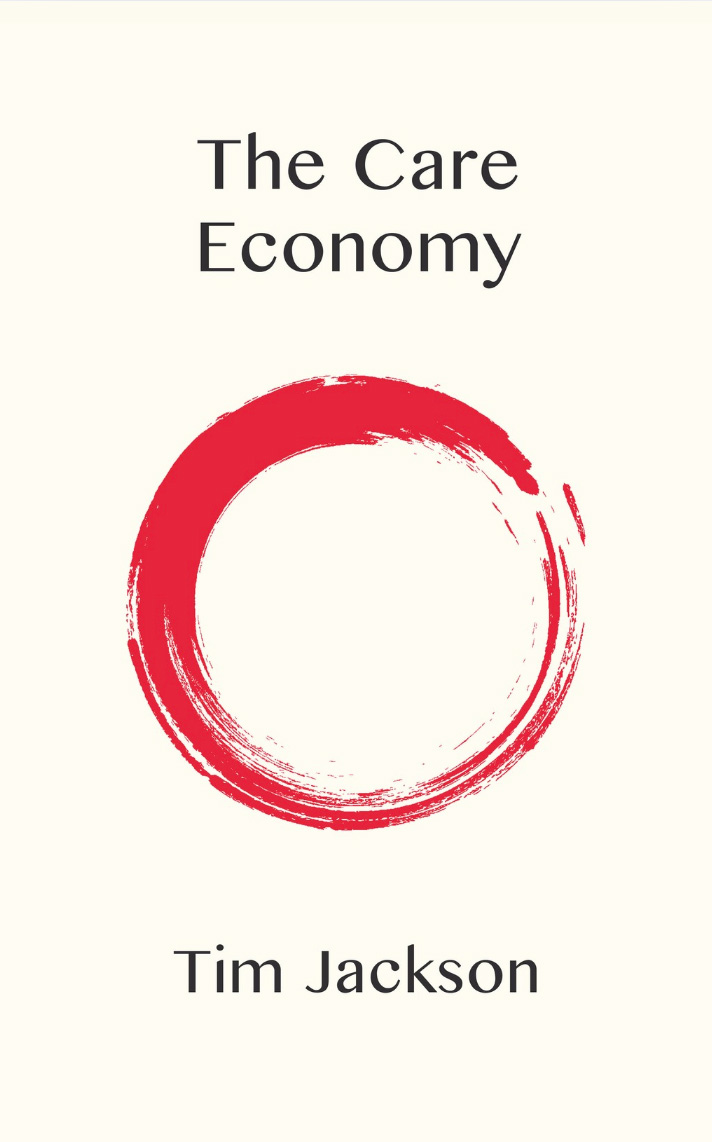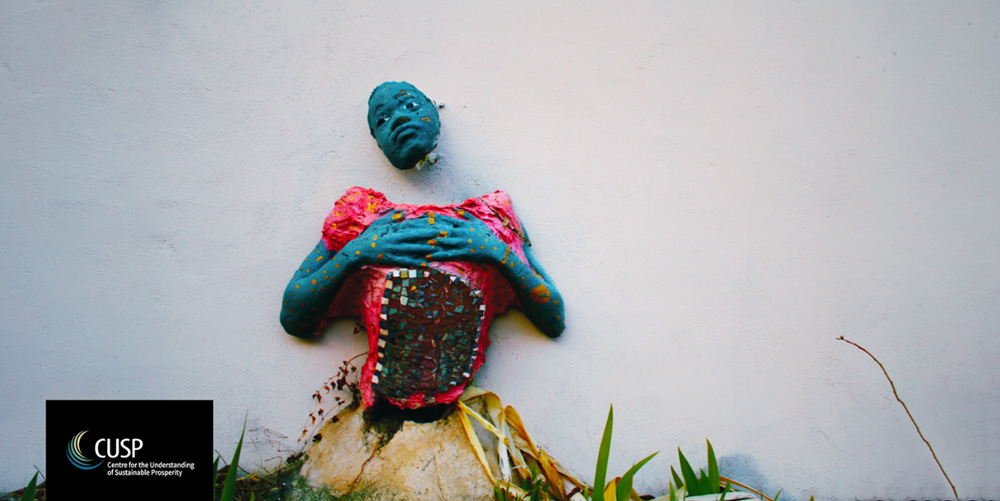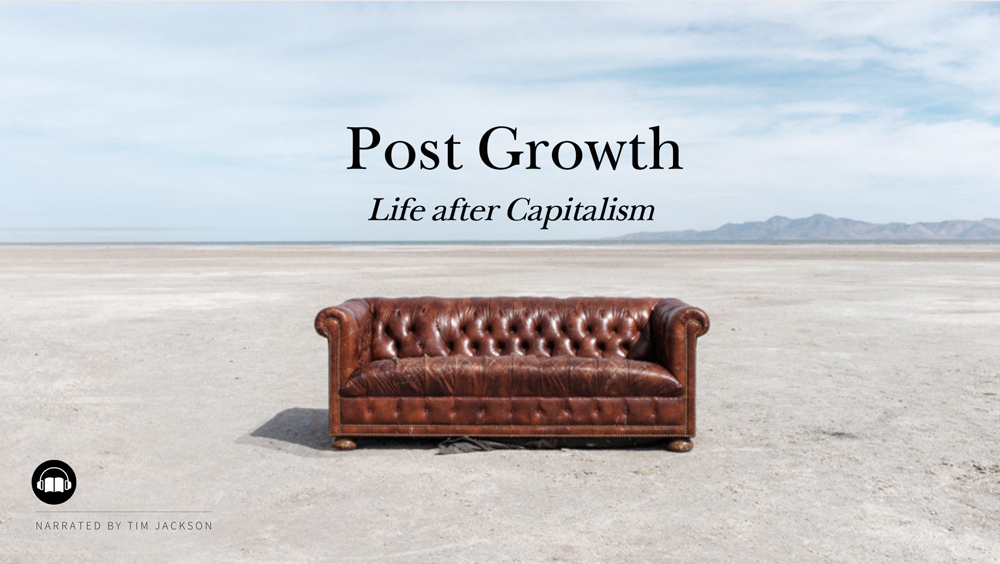The Care Economy
Care is the foundation for life itself. But its fate in the economy is precarious and uncertain. In our hearts it’s honoured as an irreducible good. But in the market it’s treated as a second class citizen—barely recognised in the relentless rush for productivity and wealth. How did we arrive in this dysfunctional place? And what can we do to change things?
CUSP Director Tim Jackson sets out to tackle these questions in this timely and deeply personal book. Irreverent, insightful and profoundly inquisitive, The Care Economy offers a bold and accessible manifesto for a healthier and more humane society—a powerful antidote to a conflict-ridden world.
Content
Prologue :: 1 The Road to Hell :: 2 Euphoria :: 3 Vital Signs :: 4 The Myth of Care :: 5 No Good Deed :: 6 Passerelle :: 7 Shoot the Messenger :: 8 The Lost Generation :: 9 Care in the Time of Cholera :: 10 Pathogenesis :: 11 Death and the Maiden :: 12 Fuck the Patriarchy :: 13 Land’s End :: 14 Jenga :: 15 The Red Pill.
Read chapter summaries
Prologue
In which we first encounter the goddess Care, acquaint ourselves with her role in Roman (and Greek) cosmology – and learn to distrust the patriarchy.
1 The Road to Hell
In which we’re introduced to two key propositions: that prosperity is primarily about health rather than wealth; and that, in consequence, the economy should be organized around care rather than growth. And in which it becomes clear that nothing is ever that simple.
2 Euphoria
In which we learn to distinguish between the maintenance of health, the avoidance of pain and the pursuit of pleasure. From the dubious remedies of the nineteenth century to the opioid crisis of the twenty-first, we discover how a restless desire for euphoria has been weaponized in the pursuit of profit.
3 Vital Signs
In which the joy of wild swimming introduces us to the wisdom of the body – the ability to regulate our own ‘internal environment’; and in which we learn what happens when that ability is disturbed, either occasionally (as it is in nature) or systematically (as it is in capitalism).
4 The Myth of Care
In which we ponder the true nature of care, not as a moral injunction but rather as a restorative force: a central organizing principle so indispensable to organic life that it’s deeply engrained in our instincts; and in which we start to explore why this principle is constantly overridden by economics.
5 No Good Deed
In which we pay a visit to the birthplace of a dream and learn how a vision of universal healthcare inspired the welfare state; and in which we discover what happened when that dream was exposed to the harsh light of the market and to the changing burden of global disease.
6 Passerelle
In which we begin to understand how the principle of care can help us define a viable alternative to the lure of eternal growth: an economy that is compatible with the limits of a finite planet, consistent with the principle of social justice and more conducive to human wellbeing.
7 Shoot the Messenger
In which the history and epidemiology of diabetes offer insights into a ‘pandemic’ of chronic lifestyle diseases which now threatens to swamp healthcare and overwhelm the public purse; and in which we confront the battle between the protection of global health and the pursuit of economic growth.
8 The Lost Generation
In which the dawn light across the Paris skyline illustrates the sometimes conflicting demands of our physical and psychological wellbeing. Gertrude Stein’s ‘lost generation’ and Florence Nightingale’s career provide contrasting backdrops to the ‘food wars’ that now compromise our health.
9 Care in the Time of Cholera
In which we encounter the bacterium E. coli in the protected waters of Chichester Harbour and trace the history of sewerage from the cholera outbreaks of the nineteenth century to the regulatory failures of today. Hygiene, gut health and social reform all support the curious idea that disease itself is a form of care.
10 Pathogenesis
In which a territorial spat between two French chemists turns into a schism at the heart of medicine – a rift between two distinct views about how to combat disease; and in which we learn how capitalism itself became the arbiter in this dispute, ultimately favouring the side that generates more profit.
11 Death and the Maiden
In which we encounter the economist William Baumol on the road to Stonehenge and learn why computers get cheaper but healthcare doesn’t. The philosopher Hannah Arendt and the ancient gods of healing help us unpack the structural forces within capitalism which undermine care.
12 Fuck the Patriarchy
In which the novels of Daphne du Maurier, the history of pre-modern witch hunts and the curious phenomenon of Barbenheimer help us to untangle the troubled relationship between gender, violence and care; and in which we finally confront the distorted logic of the patriarchy.
13 Land’s End
In which the rugged Cornish coastline holds the clue to an abiding puzzle and we begin to see how our own existential anxiety creates the potential to destroy the world. The confrontation between care and violence is offered a partial resolution through the task of coming to terms with our own mortality.
14 Jenga
In which we draw together the main strands of the argument and synthesize the contours of the care economy – not as a subsector of business as usual or as a site of special pleading, but as a powerful vision with the potential to renew our sense of shared prosperity and deliver a state of wellbeing.
15 The Red Pill
In which we tackle the question ‘What shall we do about it?’, explore a long legacy of policy proposals and synthesize several incarnations of care: as a principle, as an investment, as an unpaid debt, as climate transition, as freedom and as a new foundation for cultural meaning.
Book links
- You can preview, purchase and review the book online on the usual platforms including Hive, Waterstones and Amazon.
- Discount code: For a 40% discount, please go to the Polity website und enter the code TJAC4 at checkout.
- An audiobook edition—narrated by Tim Jackson—is available on common platforms such as Spotify, Audible and Apple Books.
- The launch date for the US is scheduled for the 27 May 2025.
Translations
- A German translation of the book has already been published by Oekom Verlag. The launch event took place on 2 April 2025 in Berlin. A Spanish translation is currently being prepared.
Reviews
»The absence of ›Care‹ as a primary purpose of economics limits the reach of policy. Tim Jackson shows not only what is missed by this, how policy must stretch to be inclusive, but also what gives us a better economics as a discipline and what might be a better economy.«
Michael D Higgins, President of Ireland
»The Care Economy is a well-timed warning about the dire consequences of prioritising wealth over health and sacrificing happiness for growth. Jackson takes his reader on a fascinating journey, peppered with entertaining characters and colourful stories. But his message is deeply serious – as persuasive as it is challenging. A ›must read‹ for anyone who cares about the future. A book that could change the world.«
Dr Michael Dixon CVO, OBE, FRCP (hon), FRCGP
Chair of the College of Medicine
»The Care Economy is a profoundly insightful and personal book with a powerful message: A new economics guided by care for people and planet is urgently needed. I applaud Tim Jackson and this manifesto for a healthy and sustainable world.«
Riane Eisler, author of The Chalice and the Blade and The Real Wealth of Nations
»The Care Economy rocks. Enjoy the rhythms of this compelling take-down of the dismal science and dance to the beat of new economic principles, joyfully explained. This music will stick in your head.«
Nancy Folbre, author of The Invisible Heart
»Why do we sacrifice health for wealth? Why are we so careless with care? From the staggering rise of chronic disease to the dark persistence of gender-based violence, Tim Jackson’s sharp, uncompromising examination of capitalism’s failings is also a passionate call to arms. A manifesto for The Care Economy.«
Stephanie Kelton, author of The Deficit Myth
»We are taken on a tour of everything that makes, breaks and takes care. Yes, care, this word that has been denuded so much in today’s thoughtless culture by soppiness, shallowness and exploitation. Tim Jackson cuts through much of the cant about care to show why a care-full society is the good society and how that requires infrastructure. With many personal details and his wondrous but lightly worn erudition, he shows that unless we restructure the economy and how we live to deliver deep care, society will be taken by brutal forces into ever starker divisions. I’d like all politicians to read this brilliant book.«
Tim Lang, Emeritus Professor of Food Policy, City & St Georges, University of London
»What is care, anyway? Care is Misery. Care is Cure. And therein, lies the rub and our salvation. Because care is half of homo sapiens, half of us. The justice ethic, and the care ethic; the male rubic, and the female rubric. It’s our burden and our legacy. Tim Jackson has plumbed the depths of economics, psychology, philosophy, and spirituality to confront us with that which we can’t ignore – we were born to care, and when we choose not to, we kill ourselves, our children, and our planet.«
Robert Lustig MD, MSL, author of The Hacking of the American Mind and Metabolical
»If you want to understand why it’s high time to reframe the whole concept of care (and you should) then start here. Drawing insights from literature, politics, psychology, philosophy, biology, feminism, pop culture and more, every chapter of The Care Economy surprises, provokes and illuminates. Profoundly radical and ultimately practical, it is also that rare thing for a book from an economist – a clear and gripping read.«
Sue Pritchard, Chief Executive, Food, Farming and Countryside Commission
»If you ever doubted what truly matters in life, you need doubt no more. Prosperity, equity and harmony between people and planet are all about health, not wealth; about care, not growth. Tim Jackson takes us on a remarkable journey, exploring how to reshape the global economy, making his case with compassion, honesty and analytical force.«
Johan Rockström, Professor of Earth System Science and author of Breaking Boundaries (now a Netflix documentary)
»A forthright and original book. Jackson encourages his readers to think afresh about their own well-being – and that of humanity and the planet.«
Matthew Taylor CBE, political strategist and broadcaster
»Is there such a thing as poetic economics? A postgrowth page-turner? Everyone who dreams of a better world should read this compelling account of how a care economy could replace our current capitalistic, growth-addicted system.«
Joan Tronto, author of The Caring Democracy and Who Cares?
»In this deeply personal book, Tim Jackson takes readers on a wonderful journey into the possibilities for an economy of care, offering a unique take on the potential for modern economic practices to be transformed into something more humane, universal and healthy for people and planet.«
Remco van de Pas, International Institute for Global Health, UN University





